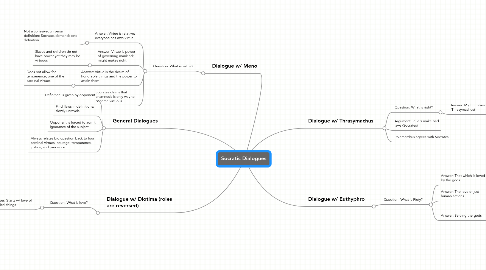
1. General Dialogues
1.1. Definition is given by opponent
1.2. Find flaws in definitions; slowly unravels
1.3. Opponent is forced to admit ignorance of the subject
1.4. Always relates big question back to four cardinal virtues: courage, temperence, justice, and prudence
2. Dialogue w/ Diotima (roles are reversed)
2.1. Question: What is love?
2.1.1. Answer: Starts w/ love of physical things
2.1.1.1. Becomes love of virtue (courage, temperence, justice)
3. Dialogue w/ Meno
3.1. Question: What is virtue?
3.1.1. Answer: Virtue is relative; everyone has own virtue
3.1.1.1. Not a cohesive, universal definition; Socrates demands one definition
3.1.2. Answer: Virtue is power of governing mankind; might makes right
3.1.2.1. Slaves and children do not have power yet they may be virtuous
3.1.3. Answer: Virtue is the desire of honorable things and the power to attain them
3.1.3.1. Does not allow for temperence, one of the cardinal virtues
3.1.4. Socrates claims that anamnesis is only way to become virtuous
4. Dialogue w/ Thrasymachus
4.1. Question: What is right?
4.1.1. Answer: Might makes right (Thrasymachus)
4.2. Argument: Rulers make bad laws (Socrates)
4.3. Polemarchus agrees with Socrates
5. Dialogue w/ Euthyphro
5.1. Question: What is Piety?
5.1.1. Answer: That which is loved by the gods
5.1.1.1. Argument: Some things are not loved by all the gods
5.1.2. Answer: The love of just human actions
5.1.3. Answer: Serving the gods
5.1.3.1. Prayer only asks of them
5.1.3.2. Sacrifice only gives back to them what they have given
